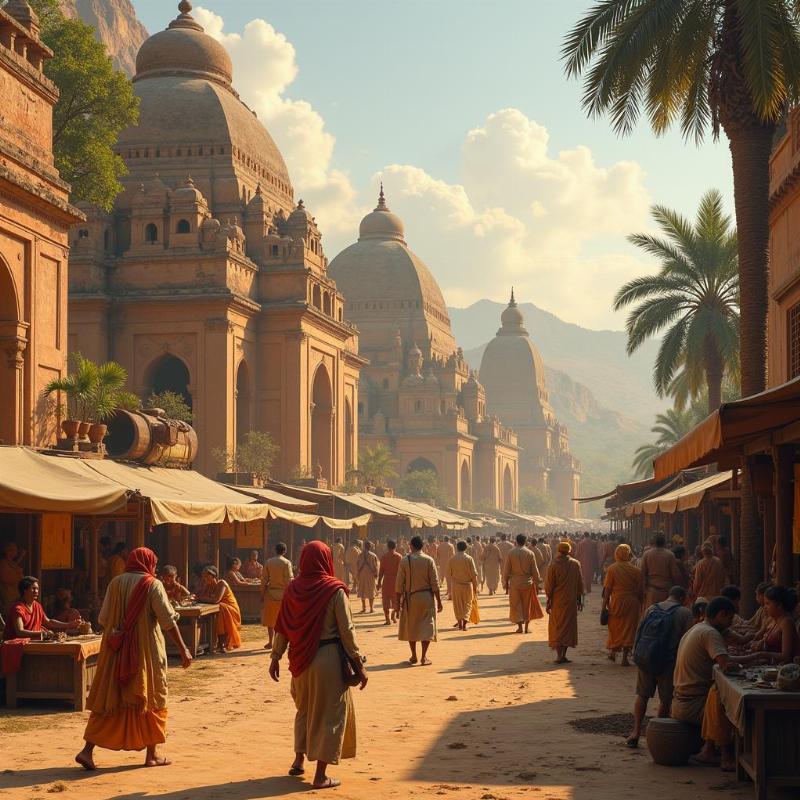Tourism in India is a significant sector, contributing substantially to the nation’s economy and cultural exchange. For UPSC aspirants, understanding the nuances of this industry is crucial. This guide explores the multifaceted aspects of tourism in India, covering its historical significance, economic impact, cultural richness, and the challenges it faces.
Historical Perspective of Tourism in India
India’s rich history and diverse cultural heritage have attracted travelers for centuries. From ancient pilgrims to medieval traders and colonial explorers, the country has witnessed a constant influx of visitors. This historical context is vital for understanding the evolution of tourism in India. The influence of various empires and dynasties on architectural marvels, religious sites, and cultural practices has shaped the tourism landscape we see today.
 Ancient India Tourism: Pilgrims and Traders
Ancient India Tourism: Pilgrims and Traders
Economic Impact of Tourism in India
Tourism is a major contributor to India’s GDP, generating employment and foreign exchange earnings. The sector’s growth has a cascading effect on related industries like hospitality, transportation, and handicrafts. Understanding the economic dimensions of tourism, including its contribution to regional development and poverty alleviation, is essential for UPSC preparation. The sector’s potential for creating sustainable livelihoods and promoting inclusive growth is also a key area of focus.
Cultural Tourism in India: A Tapestry of Diversity
India’s vibrant cultural tapestry, encompassing a multitude of languages, religions, traditions, and art forms, is a major draw for tourists. From the majestic Himalayas to the serene backwaters of Kerala, each region offers a unique cultural experience. Exploring these diverse cultural landscapes not only enriches the tourist experience but also fosters cross-cultural understanding and appreciation. tourism in india essay upsc provides further insights into this aspect.
Challenges and Opportunities in Indian Tourism
While the tourism sector holds immense potential, it also faces several challenges. Issues such as infrastructure development, sustainability, and the preservation of cultural heritage need to be addressed to ensure responsible and inclusive growth. Understanding these challenges and exploring potential solutions is crucial for aspiring civil servants. issues in tourism industry offers a deeper dive into these concerns.
What are the key infrastructural challenges faced by the Indian tourism sector?
Lack of adequate transportation facilities, accommodation options, and sanitation infrastructure are some of the key infrastructural bottlenecks hindering the growth of tourism in India.
How can sustainable tourism be promoted in India?
Implementing eco-friendly practices, promoting responsible tourism behavior among visitors, and empowering local communities are crucial steps towards ensuring sustainable tourism development.
Medical Tourism in India: A Growing Trend
Medical tourism is an emerging segment within the Indian tourism sector. The availability of quality healthcare at affordable prices, coupled with advancements in medical technology, attracts a growing number of international patients. Understanding the dynamics of medical tourism and its implications for the Indian healthcare system is also relevant for the UPSC exam. medical tourism in india upsc provides a comprehensive analysis of this topic.
Conclusion
Tourism in India is a dynamic sector with significant implications for the country’s economic and cultural landscape. Understanding its various dimensions, including its history, economic impact, cultural significance, and the challenges it faces, is crucial for UPSC aspirants. By grasping the complexities of this sector, future policymakers can contribute to developing strategies for sustainable and inclusive tourism development.
FAQ
- What is the role of the Ministry of Tourism in promoting tourism in India? The Ministry of Tourism formulates national policies and programs for the development and promotion of tourism in the country.
- How does tourism contribute to cultural preservation? Tourism can incentivize the preservation of cultural heritage by generating revenue for the maintenance and restoration of historical sites and cultural practices.
- What are some examples of ecotourism initiatives in India? Several initiatives promote responsible travel and conservation in ecologically sensitive areas, such as community-based tourism projects and wildlife sanctuaries.
- How does tourism impact local communities? Tourism can create employment opportunities, generate income, and support local businesses, but it can also lead to displacement and cultural commodification if not managed sustainably.
- What are the future prospects of tourism in India? With increasing global connectivity and rising disposable incomes, the Indian tourism sector has immense potential for growth, provided that challenges related to infrastructure, sustainability, and inclusivity are addressed effectively.
- How can technology be leveraged to enhance the tourism experience in India? Digital platforms, mobile applications, and virtual reality can be used to provide tourists with personalized information, booking services, and immersive experiences.
- What is the significance of tourism for India’s soft power? Tourism plays a vital role in projecting India’s rich cultural heritage and diversity on the global stage, enhancing its soft power and international standing. royal tour can further illuminate this concept.
PlaTovi, a leading travel company in India, offers a wide range of travel services, including customized tour packages, hotel bookings, and visa assistance, to help you explore the incredible diversity of India. Whether you’re interested in exploring the cultural heritage of Rajasthan or the serene backwaters of Kerala, PlaTovi can help you plan your perfect Indian adventure. Contact us at [email protected] or +91 22-2517-3581 to learn more about our services and how we can help you experience the magic of India.